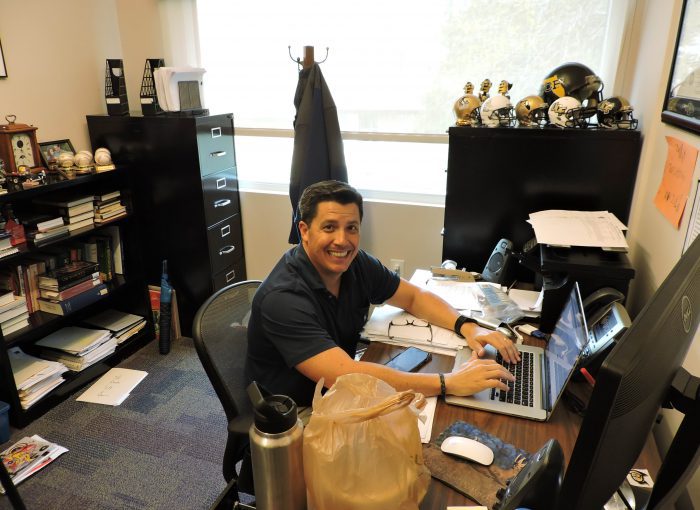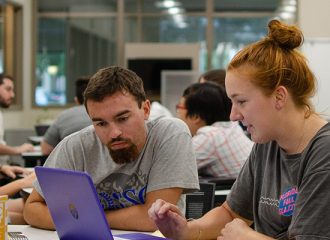by Brenden Anklam
Joe Gennaro is a music professor at UCF with a more storied background than most. A lot of us dream about becoming a musician, but few of us have the drive to see it to the end. Joe, a talented pianist, turned a childhood passion into a career. Here, we talk about his introduction to music, his views on teaching it, and how it can be applied to all walks of life. Most importantly, we talk about how this isn’t a career for only the “born gifted.” It’s for anyone who has a work ethic made of steel.
How did you first get into music?
My family always appreciated the arts and pushed me into it at an early age like most parents do. My parents said I embraced and enjoyed it instantly and started taking it seriously as early as grade school.
How did you learn? Self-Taught or Learned from a Teacher?
Some people say romantic things like I didn’t choose “x” instrument, it chose me. However, for me, I honestly feel like I chose it. I took lessons from a piano instructor while at Rollins College, and I committed four hours a day to playing it. However, I also agree that some people can learn without lessons. For example, with pop music, it’s about creating on your own. It’s a different way of thinking. By playing other’s music and jam sessions and tinkering around, there are just some people that have a proclivity for it. It marvels me what pop musicians can do.
So, would you say that there is no set path in learning music?
It’s really up to the individual. There is a set path to get a degree, or if you want to be a concert pianist, there is a process to get to that point. That’s a formal process. However, there are others who take a different route, and that’s fine with me too. For example, you have the Beatles; you can’t teach that. They were self-taught through experience. Long, long sets in nightclubs. And that’s how they came to know it. To that, I say good for them. Sometimes you just have it. It’s a process that comes to people naturally.
How did you go from playing to teaching?
I started teaching in high school. Just piano. I always enjoyed teaching. When I majored in music, I thought I would like to do what my mentors were doing. As much as I like to play and to learn, I was never comfortable with performing. I had really bad performance anxiety that I was never able to tackle. Until my senior year at University of Central Florida. I just felt like I could fashion a career in music that didn’t involve performing. It can be very cutthroat. Very difficult. I like to tell my students that Michael Jordan hit 60 percent of his shots, but he was the greatest of all time. If you hit 60 percent of your notes on stage, you’d get booed. They’d excoriate you. It can be very unforgiving. So I felt I could still use my skills to pursue a teaching career.
How do you teach your students to get through the cutthroat process?
I give them a perspective of what I’ve been through and the perspective of what it’s like to be a responsible musician and a performer. What I try to get across to them is that we have to be more appreciative of the people that are in the audience. Sometimes people are put off by classical music. How come it’s so easy to fill a football stadium but so hard to fill a concert hall? I tell them these are things you have to consider. Regarding performing, I think it revolves around you being open to playing popular music, being open to interpretation, and allowing yourself to take creative risks. It’s just as rewarding for me to hear Pink Floyd and Led Zeppelin as it is to hear piano symphonies.
How do you encourage students to take creative risks?
Sometimes the lessons that we learn in the walls of our institution, don’t lend themselves as well to what the public may want. It’s ok to think outside of the box and go for other songs. At the end of the day, never stop listening to music. Never turn your ears off to something that you feel is beneath you.
What’s your view on being a mentor to students?
I build the type of relationship that will help cultivate ideas and then articulate them legitimately. A lot of my kids come to me and say would you mind reading my application, and it means a lot to me. I like how they look at me as someone to help them. Then, I play devil’s advocate and play the other side of the coin and say what about this? What if this happens?
How do you help students who lost motivation?
Sometimes people get into music, and they are very passionate about it. Then, they get into the academic side, and they say all they want to do is play, gig, and learn stuff for their instrument. Then students get worn down. One of the things I try to teach my students is that talent is an absolute cop-out. I look at talent as a Lamborghini that sits in a garage. That Lamborghini isn’t going 200mph, it isn’t going anywhere unless you take it out. You can have all the talent in the world, but unless you cultivate you, the talent is not going anywhere. I tell students I don’t care how talented you are; talent makes you honor bound. It makes you have to work harder. It pushes you to work harder because it pushes you to think about that person who isn’t better than you. You see this with athletes. The gifted athlete that says I have to practice harder because that person is trying to be me. All talent shows potential.
How do you feel students should interpret success?
First off, don’t think of yourself as a failure if you don’t make it to Carnegie Hall. You can contribute something to music at a very high level, but you need to find your niche. And you can’t let what other people have done dictate your success and happiness in music. That’s key for everything in life. Define your happiness and niche. It has to be something that makes you happy.
Can music be applied to other aspects of life? Should a business major take a music class?
Absolutely. I teach a class that has 525 kids from all walks of life. We talk about how our students at UCF have a well-rounded education. But how can an engineering student apply music? Well first and foremost, music is a very creative field. Anybody who takes a music course can take back the idea that there are many ways to solve and look at problems. A musician doesn’t look at the world the same as everyone else and that’s a key lesson to have. You may be very good at math, but you can teach your brain to embrace other modes of thinking. That’s what I think is important, learn how composers throughout time have been so creative. I encourage anyone not to take only one music course but to take as many as you can. How I teach my courses is not to say, here is the history of music, but to teach them about how musicians lived. They lived just like how you and I do; they lived in the heart of their times. Many of them had some very concise thoughts that are parallel to the times that they lived. When you learn how others lived, it teaches you a great deal about yourself. Education is a lifelong process, that’s truly how I feel. And music can teach us that you never stop learning, you never stop doing.
Music is something that should fill any soul with lightness and inspiration. It’s not a locked door for only those who are “musically talented.” No matter whether you’re a business major, an engineering major, or a health major, learning the thought process behind music can make your mind work in ways that were previously unimaginable. However, the silver lining is that this applies to all creative fields. From reading this, I hope you take that writing class even if you’re not a “writer,” or that painting class even if you’re not an “artist.” Don’t put self-imposed limitations on your brain. Let it be free, make it sing.




